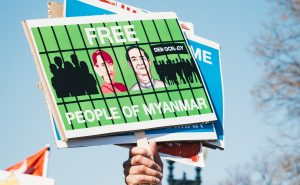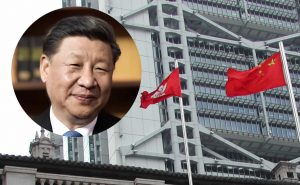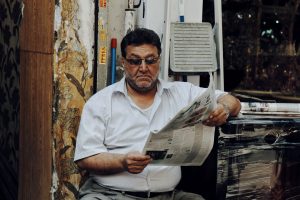London – At the same time that technology and social networks are democratizing access to information and facilitating freedom of expression, the decline of democracy in the world means that only 15% of people on the planet – or one in every 7 – have freedom of speech. According to a report by the British NGO, Article 19, published in London this Thursday, which highlights Brazil as one of the countries in a troubled situation.
“From Russia to Myanmar, Ethiopia to Brazil, authoritarian rulers like Vladimir Putin, Jair Bolsonaro and Narendra Modi continue to tighten their control over what we see, hear and say,” the report, published concurrently with the Inter-American Society of the American Society, said. does,” he warns. Press showing Brazil as one of the countries with freedom, One of the most restricted in the Americas.
Globally, the report’s data shows that freedom of expression has declined significantly since 2011. According to the document, 80% of the world’s population lives with less freedom of expression than a decade ago.
Autocracies cause a global decline in freedom of speech
The Global Report of Expression annually analyzes freedom of expression and information in 161 countries based on 25 indicators. The score divides countries into five categories: free (green); less constrained (yellow); restricted (orange); highly constrained (red) and in crisis (purple), on a scale of 0 to 100.
The global score has dropped from 56 (2011) points to 50 (2021) points in the last ten years. And all regional scores are declining or stable. Brazil is rated “restricted” on freedom of expression with 50 points.
In the overall ranking, Brazil was ranked 89th out of 161 countries. Denmark (95 points), Switzerland (95) and Sweden (94) took the first places.
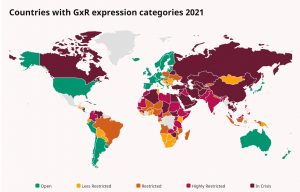
This year’s report indicates that 35% of the world’s population – 2.7 billion people – currently live in a country in a freedom of expression crisis. Currently, this is the largest category, both in terms of population and number of countries – there are 40 countries classified in this way.
Five new countries have joined the group classified as ‘in crisis’ this year: Myanmar, Afghanistan, Sudan, Hong Kong and Chad – all with autocratic or highly oppressive governments. Only 15% of the world’s population lives in countries with full freedom of expression.
Brazil has become the third most withdrawn country on freedom of expression in the past 10 years. A 38-point drop from 88 (2011) to 50 (2021), bringing the classification change from “open” to “restricted”. The country was second only to Hong Kong (-58 points) and Afghanistan (-40 points).
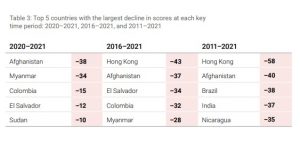
North Korea (0), Turkmenistan (1) and Syria (1) filled the last positions.
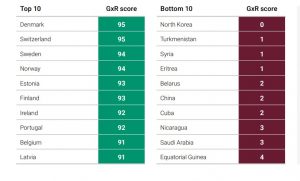
“Liberties are more precarious than ever, and scores are falling at higher rates than ever before,” the document says.
Most of the countries that have made progress over the past decade, such as Sudan, Myanmar, Afghanistan and Sri Lanka, have regressed.
“These are all countries that the world looks to at the same time as democratizing nations and beacons of hope, but for the crushing of their freedoms and the de facto disappearance of respect for human rights.”
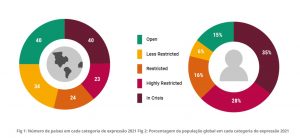
The report notes that, with the occurrence of five worldwide coups in 2021 (plus another one in Burkina Faso in January 2022), autocratic leaders are acting increasingly boldly against democracy, both in their seizure of power and within democratic government, from within the systems and institutions. emphasizing the erosion. .
“Undemocratic changes in power rarely bode well for freedom of expression: the violence with which regimes attack journalists, activists and the population on the fly shows that repressive regimes – militias and the military – are aware of the power of information and expression.”
Read more
UN condemns ‘digital dictatorship’ imposed by military on Myanmar society
Article 19 highlights that militarization is a worldwide trend in suppressing freedom of expression, and many countries place military personnel in key positions during the covid-19 pandemic.
“Military structures are rarely a good sign for freedom of expression.
Military personnel are strictly hierarchical, authoritarian, antidemocratic and deeply patriarchal, with the exception of lesbian, gay, bisexual, transgender, queer and intersex (LGBTQI+) women and people.
(…) Many military personnel who have come back to power in recent years have a history of violence, repression and human rights violations, including war crimes and genocide.”
According to the NGO, suppression of freedom of expression is not just a symptom of autocracy: it creates the environment for autocratic leaders to emerge.
Read more
For ‘safety’ Hong Kong restrains media at July 1 celebrations with Xi Jinping present
Under Bolsonaro, Brazil saw freedom of expression decline
It is not only conflicts, occupations and coups that kill freedom of expression. And Brazil is an example of this: the country has witnessed one of the most shocking disruptions in the world in the past decade, all under the influence of a democratically elected leader, the report underlines.
“Bolsonaro’s harassment and media stigma go hand in hand with continued attacks on the judiciary and questions about the integrity of the electoral system.”
For the organization, attacks on journalists and media professionals “eerily widespread in recent years” have dragged Brazil’s data down.
“The number of attacks against journalists and media outlets in 2021 was the highest since the 1990s, with 430 attacks last year.
The increase in press freedom violations in Brazil showed clear correlations with both the scores and the number of attacks, which rose more than 50% in the year Bolsonaro was elected.
The report highlights that since Bolsonaro took office, the work of the Brazilian press has been hampered, while professionals have been the target of online harassment by the CEO and his children.
Read more
Trust in news drops in Brazil and around the world but still higher than before covid
In addition, misinformation during the pandemic also poorly positioned Brazil in the index. According to the NGO, the country has experienced a “hurricane of disinformation” controlled by a president who “totally ignored scientific facts”.
“While Brazil’s score decline has stabilized since 2019, the 2022 presidential election will be a test of Brazilian democracy.
At a time when Bolsonaro continues to make statements like “Only God can take me out of the presidency” and commentators draw analogies to Trump and the Capitol Hill uprising, 2022 can reveal how much. [da liberdade de expressão] It was eroded under Jair Bolsonaro.”
Looking at the Americas as a whole, 48% of people in this region live in environments with freedom of expression (data from US and Canadian populations).
However, as in Brazil, autocracies are deepening the crisis in other places such as Nicaragua, Venezuela and Cuba.
The challenges in Latin America are extreme levels of physical violence and threats to activists and communicators: more than 70% of killings of human rights defenders took place in the Americas. The three countries with the most murders were in this region: Colombia, Mexico and Brazil.
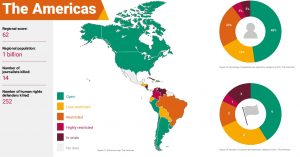
The full report can be accessed at this address. connection.
read it too
source: Noticias
[author_name]
